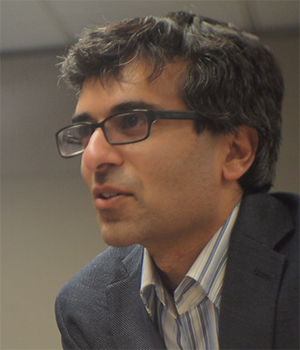
Soumya Raychaudhuri, MD, PhD
Soumya Raychaudhuri serves as the Director for the Center for Data Sciences (BWH, HMS) and is appointed as an Associate Member at the Broad Institute. Additionally he is clinically active and sees patients at Brigham and Women’s Hospital Arthritis Center. After completing his MD/PhD at Stanford University, Raychaudhuri pursued clinical training in internal medicine, and then went on to pursue subspecialty training in rheumatology at Brigham and Women’s Hospital. He concurrently completed postdoctoral training in human genetics at the Broad Institute with Dr. Mark Daly. Since joining the faculty at Harvard Medical School in 2010, he has contributed to the understanding of the genetic basis of rheumatoid arthritis and other immune-mediated diseases. He has also been at the forefront of devising statistical and computational methods to localize genetic association signals to causal variants, and to interpret human genetic data in the context of functional information. He currently has active research programs in the human genetics and functional genomics of tuberculosis, type I diabetes, and rheumatoid arthritis, with a specific focus on using genomic strategies to understand CD4+ T cell biology.
Med
View full abstract on Pubmed
Sci Transl Med
View full abstract on Pubmed
Nat Commun
View full abstract on Pubmed
Nature
View full abstract on Pubmed
J Rheumatol
View full abstract on Pubmed
J Exp Med
View full abstract on Pubmed
Arthritis Rheumatol
View full abstract on Pubmed
J Am Med Inform Assoc
View full abstract on Pubmed
ACR Open Rheumatol
View full abstract on Pubmed
Nat Genet
View full abstract on Pubmed